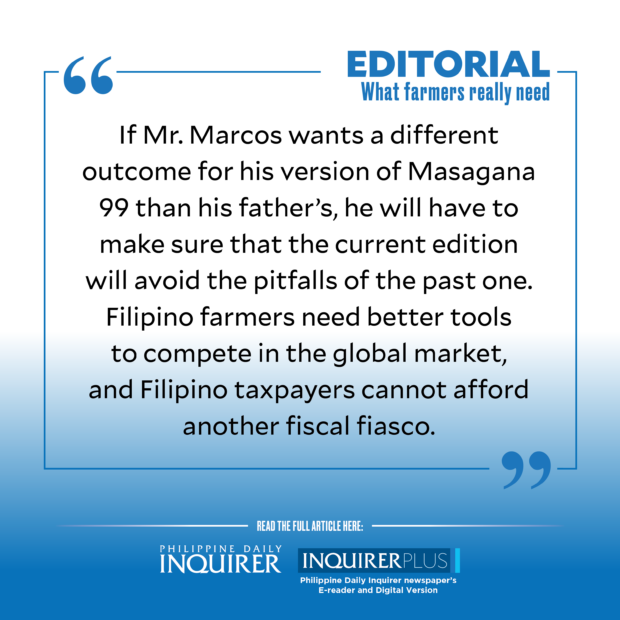“Insanity is doing the same thing over and over and expecting different results.”
Thus said Albert Einstein, supposedly, but this attribution is nowadays commonly disputed.
What is indisputable, however, is the fact that President Marcos has ordered the revival of many programs and policies instituted during the 20-year rule of his late father in the hopes of ostensibly reviving the so-called golden age of the Philippines.
Without a doubt, many of those policies produced stellar results, especially at the outset. But many of those same policies also eventually collapsed and fell into disrepute once the zeal of implementation of all involved waned and the ne’er-do-wells in power stuck their fingers into the proverbial pies.
Last week, the President ordered the revival of yet another of the elder Marcos’ schemes in the form of the Masagana 99 program—literally meaning “bountiful 99” — that was meant to boost the yield of the country’s rice farmers to 99 cavans of the staple food per hectare of cultivated land.
Agricultural experts agree that the program was a success at the outset, especially in achieving its stated goal of raising rice output to combat a shortage of this politically sensitive food item in the early 1970s and helping keep prices in check.
By the early 1980s, however, Masagana 99 was shut down after its funds were depleted as farmers who availed of cheap loans from the government for buying seedlings, fertilizer, and machinery defaulted on their loans. The collateral damage included over 800 rural banks that went bankrupt after having served as conduits for government-guaranteed or -subsidized loans to the farmers which had, by then, become uncollectible. And years later, the government had to make good on these guarantees and compensate the banks to the tune of hundreds of millions of pesos — a hefty sum for a state that was already swamped with debt.
Today, the Philippine government is once more up to its neck in foreign and domestic loans, no thanks to the massive borrowing program undertaken by the Duterte administration to, initially, fund its infrastructure buildup campaign, but later to address the worst effects of the COVID-19 pandemic. As such, the government’s total loans now stand at slightly above the internationally accepted threshold of an equivalent of 60 percent of the country’s total gross domestic product.
It goes without saying that the Philippines does not have the luxury of blowing away more funds on programs that have already been proven to fail in their original incarnations — programs like Masagana 99 in their original form.
At the same time, there is no doubt that the country’s farmers urgently need all the support they can get from the government. But the kind of support that will benefit them most over the long run are not dole-outs of cash or even agricultural inputs, but the kind of help that will give them an edge over farmers of higher productivity around the world, all of whom are now their competitors in this increasingly borderless world. Filipino farmers need training, they need access to technology, and they need better logistics systems that will allow them to transport their produce to the marketplace at a lower cost.
If the Marcos administration is serious about making the present incarnation of Masagana 99 work, it must go beyond the program’s name that’s meant to evoke memories of a glorious past of Philippine agriculture. It must make sure that the new program will make Filipino farmers more productive and more competitive, especially now that the country has become a signatory to the Regional Comprehensive Economic Partnership which will lower import tariffs on foreign goods to levels even lower what the rice tariffication law has already brought them to.
If the President and his men can ensure that precious public funds are used properly for these purposes, then a new Masagana 99 program would be a good idea. But without safeguards and improvements to a system that has already failed in the past would be a great folly.
If Mr. Marcos wants a different outcome for his version of Masagana 99 than his father’s, he will have to make sure that the current edition will avoid the pitfalls of the past one.
Filipino farmers need better tools to compete in the global market, and Filipino taxpayers cannot afford another fiscal fiasco.


